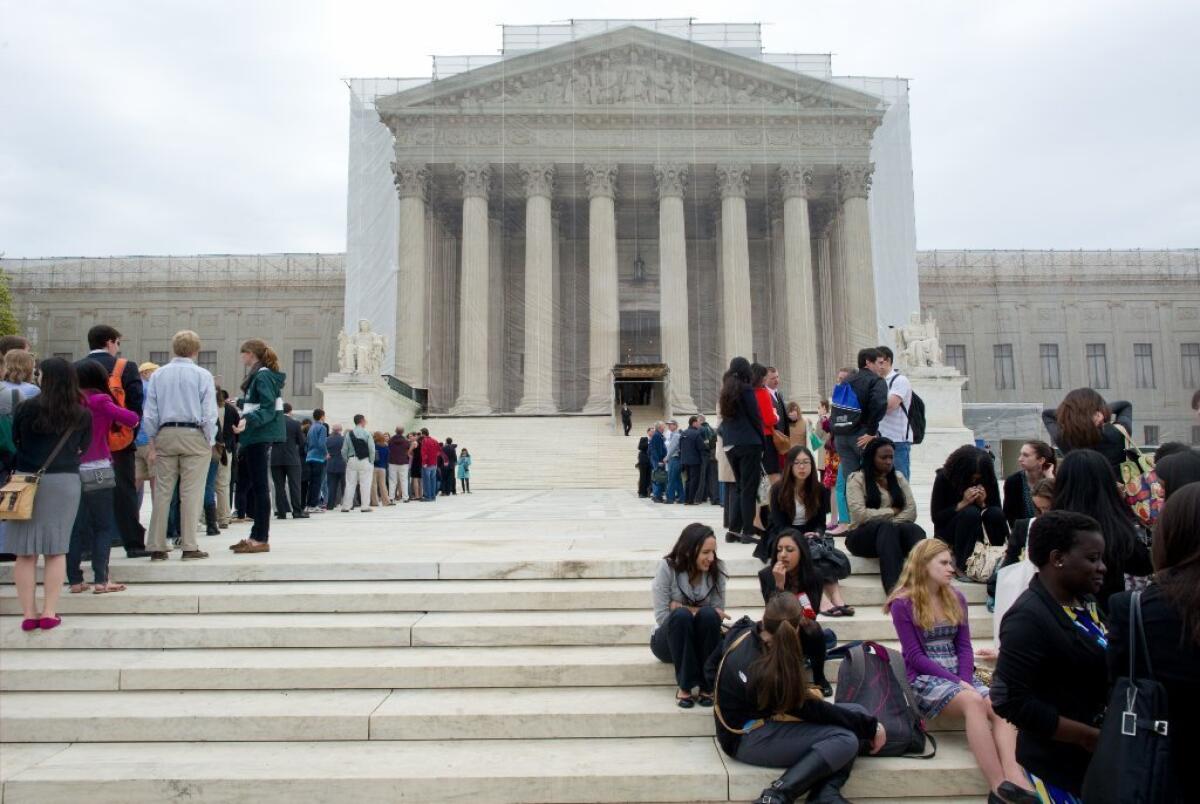Supreme Court considers gene patents; scientists react

- Share via
As the U.S. Supreme Court heard oral arguments in the case against Myriad Genetics, scientists who are skeptical of the idea of patenting genes said they were hopeful that the justices would overturn the Utah company’s claims.
“I was on pins and needles the whole time,” said Dr. Wayne Grody, director of the Diagnostic Molecular Pathology Laboratory at the Ronald Reagan UCLA Medical Center, who was present at the arguments. “But at the end I thought, ‘The justices really get it’ ... I felt that all of them who spoke weren’t comfortable with the idea of patenting a gene.”
Myriad, which provides genetic testing services, holds patents on the BRCA1 and BRCA2 genes, variations of which are associated with increased risks of breast and ovarian cancer. If a woman wants to get tested to see if she has a dangerous version of either gene, she has to get tested by Myriad -- which charges thousands of dollars for the service.
The company claims that its patents, which cover isolated DNA sequences, are valid precisely because they’re isolated from the rest of a person’s DNA. But scientists like Grody, who helped the plaintiffs with their case against the company, don’t agree. They argue that a portion of DNA plucked out of the genome is still a product of nature, and therefore not patentable.
“The justices really focused on a gene as a product of nature,” Grody said. “They kept making the analogy of finding a medicinal plant in the Amazon. You can’t just pick the plant up and patent it.”
Dr. Eric Topol, director of the Scripps Translational Science Institute in La Jolla, said that Myriad’s patents on the genes “have really held back the field,” as the company has issued cease-and-desist letters to some academic centers attempting to study the BRCA1 and BRCA2 genes.
UCLA’s Grody said that similar patent challenges involving different genes had disrupted studies of certain hereditary neurological diseases at his university. Stanford cardiologist and geneticist Dr. Euan Ashley said he thought the threat of patent suits had affected adoption of genetic testing for risk of long QT syndrome, an inherited cardiac disorder that can cause sudden death.
Myriad’s patents also have a chilling effect on genomics research because the company’s tight control over BRCA1 and BRCA2 test results has prevented scientists from accessing useful data about genes and associated traits, Topol said.
“They not only have the method of sequencing,” he said. “They also have a central mission control -- defining within these two genes, which have hundreds of thousands of DNA letters, all the important letters. The medical community doesn’t have that data.” Geneticists can sequence a person’s DNA on their own, he explained, but only Myriad knows what variants of particular genes are the important ones.
“They’ve cracked the code,” Topol said.
Another researcher-physician who’s concerned about gene patents’ effects on genomics research, Dr. Robert Nussbaum of UCSF, is working to convince laboratories and patients to release de-identified genetic information into the public domain to help scientists figure out which DNA variations are related to what outcomes.
On Monday, Nussbaum arrived at the court at 5 a.m., hoping to get a seat in chambers. He was too late -- the courtroom was packed with VIP spectators, including National Institutes of Health director Dr. Francis Collins and DNA co-discoverer James Watson -- but after hearing about the day’s proceedings at an ACLU luncheon, he said he was optimistic the justices would rule against gene patents, though he worried he might “jinx things.”
“It’s not just an economic issue, it’s a moral issue,” he said. “I care for a lot of patients with hereditary diseases. The landscape has not been ideal for pushing testing forward, getting the best possible interpretation and benefiting our patients.”
The Supreme Court is expected to issue its ruling on the Myriad Genetics case before its term ends in June.
Follow me on Twitter: @LATerynbrown







